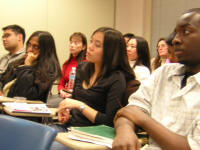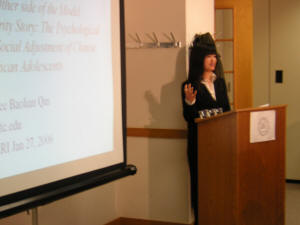Research on Asian origin children and adolescents in the U.S. has focused predominantly on their educational achievement. This emphasis, however, ignores not only the diversity of Asian students’ educational experiences but also their psychological and social well-being. A small but growing body of research suggests that while Asian American students may be doing well in school, they face many challenges in this psychological and social adjustment.

National data show that Asian American adolescent girls have the highest rates of depressive symptoms of all racial groups and have the highest suicide rate among all women between 15 and 24 years of age. Some studies on Asian American boys suggest that they tend to be more withdrawn and depressed compared to their peers from other ethnic groups. Mental health of children and adolescents is also become a rising concern in the Asian American community.

In this presentation, I will draw on my research with Chinese immigrant children and families as well as other research findings to examine the psychological and social adjustment of Chinese American children. I will explore family and school factors that may contribute to the struggles Chinese American adolescents face in their development. More specially, I will examine the issue of growing emotional alienation in many families and the issue of peer bullying and lack of adult support at school. To conclude, I hope to discuss with the audience what schools, families, and communities can do to address these challenges toward the goal of promoting healthy development of all Asian American children.


